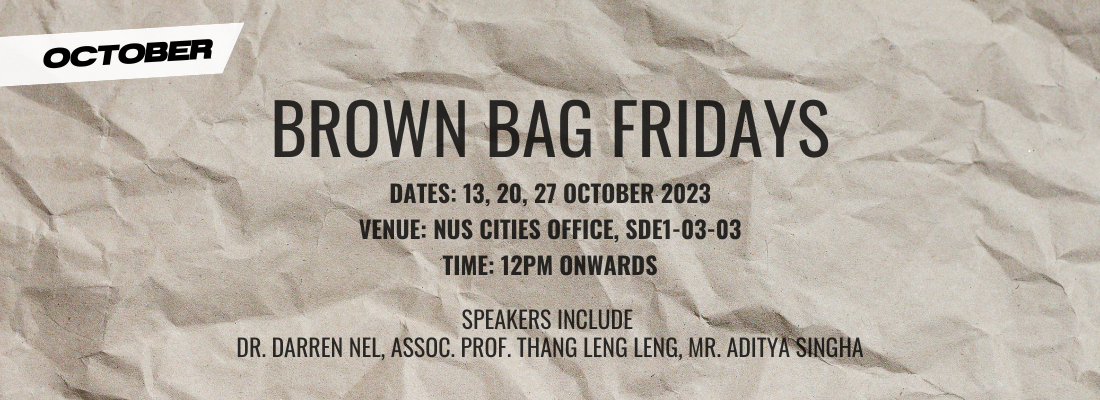Brown Bag Fridays - October Series

Time: 12PM onwards
13 October 2023 |
Hold the Door: An Analysis of the Barriers to Complexity Science's Use in Mainstream Policymaking by Dr. Darren Nel (Postdoctoral Fellow, LKYSPP & Studio Leader, NUS Cities)
In this talk, Dr. Darren NEL will present an overview of a study conducted with Prof Araz Taeihagh that investigated the primary challenges and barriers that hinder the adoption of complexity science into mainstream policymaking. The talk will discuss these challenges as well as potential paths and opportunities to address and improve the integration of complexity science into policymaking.
Dr. Darren NEL is a Postdoctoral Research Fellow at the Lee Kuan Yew School of Public Policy and NUS Cities. He obtained his PhD from the School of Design, HK PolyU. Darren is formally trained as an urban planner and has several years’ working experience in industry. His research interests are focused at the intersections of urban planning, policy and design, urban resilience and complexity, and the spatial dynamics of cities.
20 October 2023 |
An Intergenerational approach for resilient and liveable cities by Assoc Prof Thang Leng Leng (Department of Japanese Studies, College of Humanities and Sciences)
An intergenerational approach for resilient and liveable cities - how do we foster an environment which encourages intergenerational connections, where multi-generations may thrive which would lead to stronger ties. The sharing would provide a context on intergenerational approach focusing on developments in Singapore for further discussion. Could we harness the power of stronger intergenerational communities to encourage initiatives and interventions that can improve the liveability of our city? Perhaps, lesser people would fall through the cracks and exist within the interstitials of our city, which would also strengthen our social compact and allow for better planning and governance.
A/P Thang is based at the Department of Japanese Studies, and is also Co-Director of the Next Age Institute, Fellow (honorary) of the College of Alice and Peter Tan. She teaches modules on contemporary Japanese society and culture, as well as faculty modules relating to service learning, intergenerational relations and programs. She has supervised Capstone modules on community engagements and co-taught a senior seminar titled "Asian Identities" as a fellow at the CAPT. As an anthropologist, A/P Thang focuses on anthropological perspectives and approaches in her courses.
A/P Thang's research interests are on Japan-Singapore socio-cultural issues, intergenerational relations and programming, aging, family, migration, gender with a focus on Japan and Singapore, as well as Asia in general. In the past twenty years, she has done fieldwork in Okinawa, Tokyo, Kobe, Western Australia, Chiangmai, Bangkok, Bali, Cebu, Guangzhou, Shanghai and Singapore. She is passionate on research relating to aging and intergenerational studies and her research covers a wide array of topics, including caregiving, active aging, volunteering among seniors, resilience among living alone seniors, lifelong learning, grandparent-grandchildren relationships, later life migration, environmental gerontology, aging-in-place.
27 October 2023 |
"Beyond Visualisation of Big Data: Towards Dynamic Data-driven City Planning in Singapore" by Mr. Aditya Sinha (Research Assistant, Dept of Architecture)
Cities are complex systems shaped by simultaneous dynamic processes. An increased number of recent studies have focused on analysing urban big data. However, the attempts predominantly propose means for data visualisation, but fall short in data interpretation and guidance. This paper outlines part of the larger study done in Singapore to systematically understand the dynamic urban big data, trends and anomalies in the city functioning. We outline a comprehensive framework and “DataCube-CityScan” platform that harness on dynamic economic, societal, environmental, health and attitudinal data available, such as people movement and behaviour, public transport use, shopping behaviour, etc. We use GIS alongside multiple outlier detection algorithms to analyses and identify specific trends and anomalies in real-time and alert city officials to respond, monitor changes, plan their actions and maximise their resources timely. The platform shows great capacity of guiding planning authorities’ decision-making processes, strategy development and policy-making.
Aditya is currently working as a research assistant in NUS focusing on developing framework and visualisations to analyse and detect anomalies in city data and pinpoint issues associated with it, as part of a collaborative project between NUS, NTU and A*Star. He has his Bachelor's in architecture and Master's in urban planning from Singapore. He has worked in multiple domains and has been fascinated with understanding various aspects of an urban setting. He holds particular interest in using urban analytics to understand cities, resource orchestration and optimisation, circular economy and climate change adaptation.

